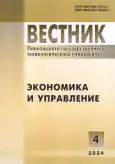A Housing and Communal Service as a Collective Good
- Authors: Visitsky N.N.1
-
Affiliations:
- Southern Federal University
- Issue: No 4 (2024)
- Pages: 15-27
- Section: ECONOMIC THEORY
- URL: https://journal-vniispk.ru/2306-2800/article/view/292188
- DOI: https://doi.org/10.25686/2306-2800.2024.4.15
- EDN: https://elibrary.ru/QACREL
- ID: 292188
Cite item
Full Text
Abstract
Introduction. The acute need to modernize the housing and utility infrastructure
and improve the quality of housing and communal services requires deep institutional
and technological transformations in this sector.
The purpose of the study is to investigate the economic nature of housing and communal services as a collective good and analyze their characteristics from the institutional theory perspective.
The research methodology involves a thematic review of the scientific works by classics (P. Samuelson, R. Coase, D. North) and modern institutionalists (A. A. Adebayo, K. R. D. Lulofs, M. A. Heldeweg) on the topic of the study.
Key results. Housing and communal services (HCSs) are of a complex economic nature since they combine the characteristics of both private and collective goods. As a collective good, HCSs are defined by consumption indivisibility and difficulty in excluding users, which necessitates their state regulation and subsidization. The primary challenge in HCS provision consists in balancing between economic efficiency and social equity. On the one hand, the housing and utilities sector requires substantial investments in infrastructure upgrades and maintenance due to its capital intensity and extended payback periods. On the other hand, the low solvency of certain segments of the population and the high social significance of these services limit the possibility of their full commercialization. The reform of the housing and utilities sector aims to eliminate monopolization, introduce transparent tariff mechanisms, and foster the development of a competitive environment. This involves not only institutional reforms, such as the reallocation of property rights and creating conditions for public-private partnerships (PPPs), but also the intensification of the use of digital technologies. Modern digital tools help increase transparency in consumption accounting, reduce costs and improve control over service delivery. An institutional approach to managing the housing and utilities sector involves a clear division of responsibilities among the state, businesses and consumers.
Conclusion. Modernization of the housing and communal services must integrate economic efficiency, social equity, and innovative technologies. The integration of digital platforms, the creation of a competitive environment, and the removal of institutional barriers are the key drivers for the sustainable development of the sector and for meeting citizens' needs.
Full Text
About the authors
Nikolay N. Visitsky
Southern Federal University
Author for correspondence.
Email: visicky@sfedu.ru
SPIN-code: 1837-6617
Postgraduate student, Department of Economic Theory, Faculty
of Economics
References
- Karataev E. M., Merkurjev V. V. Housing and communal economy: definition, structure, social significance (Russia, Kemerovo). Problems of Modern Economics. 2020;(4(76)):131–134. EDN: ABPUBZ (In Russ.).
- Marciano A. Ronald Coase, “The Problem of Social Cost” and the Coase theorem: an an-niversary celebration. European Journal of Law and Economics. 2011; 31(1):1–9. doi: 10.1007/s10657-010-9200-0
- North D. Institutions, institutional change and economic performance. Transl. from English by A. N. Nesterenko; foreword and scientific ed. by B. Z. Milner Moscow, Economic Book Foun-dation “Nachala”; 1997. 180 p. (In Russ.).
- Ostrom E. Governing the commons: the evolution of institutions for collective action. Transl. from English. Moscow, IRISEN; 2019. 447 p.
- Milestones of economic thought. Vol. 4. Welfare economics and public choice. Transl. from English. Under the general editorship of A. P. Zaostrovtsev. St. Petersburg, Ekonomich-eskaya Shkola, 2004. 560 р. (In Russ.).
- Nureev R. M., Latov Yu. V., Orekhovsky P. A. et al. Ronald Coase and the new institutional theo-ry. Monograph. R. M. Nureev, Yu. V. Latov (eds.). Moscow, KnoRus; 2022. 250 p. EDN: SZYSNB (In Russ.).
- Bardy R., Rubens A., Saner R., Yiu L. Public goods, sustainable development and the contri-bution of business. Munich/Zurich, Cambridge Scholars Publishing; 2021. 316 р.
- Adebayo A. A., Lulofs K. R. D., Heldeweg M. A. Indica-tors, strategies, and rule settings for sustainable public-private infrastructure partnerships: from literature review towards institutional designs. Sustainability. 2023;15(12): art. 9422. doi: 10.3390/su15129422
- Ermishina A. V. Public regulation evolution of local public goods in the housing economy (on the example of the major renovation of apartment buildings in Russia). Journal of Eco-nomic Regulation. 2020;11(4):64–77. doi: 10.17835/2078-5429.2020.11.4.064-077; EDN: WDCZNT (In Russ.).
- Lev M. Yu. Investments in public utilities in Rus-sia in the context of socioeconomic security: in-stitutional and evolutionary aspect. Economic Security. 2024;7(5):1137–1154. doi: 10.18334/ecsec.7.5.120937; EDN: UYNFKK (In Russ.).
Supplementary files









